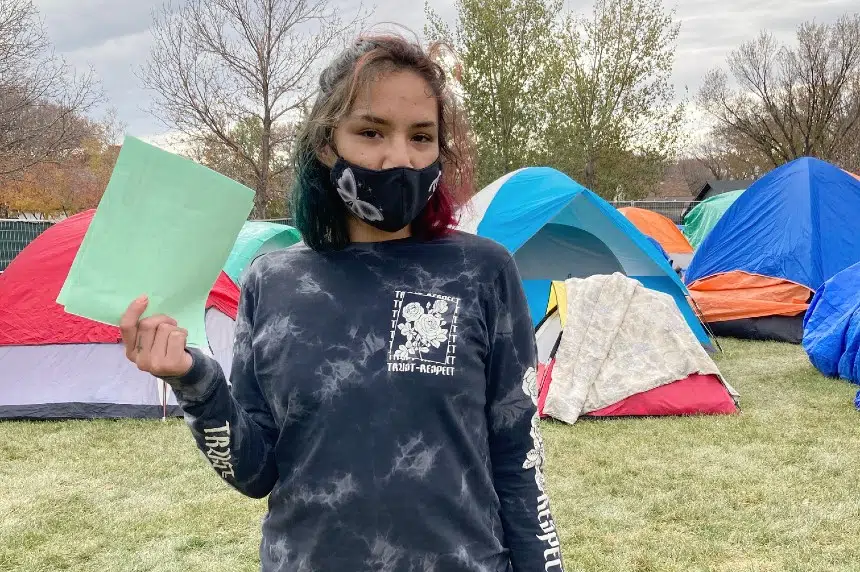After years of sleeping in garages, tents and “just random places,” Kayla Wolfe is finally looking forward to a place she can call her own.
The 21-year-old woman has been among those living at Camp Marjorie in Regina’s Pepsi Park. On Thursday, Wolfe learned she would be finding a home at some point.
“That’s all I wanted for the last three (or) four years and I’m finally going to have it. I can taste it. I can feel it,” Wolfe said.
Social services officials have been attending the camp for people experiencing homelessness. They provided Wolfe with a requisition for $80 of groceries, along with four nights at a hotel. She said they will now help her find permanent housing.
“I feel great to actually get on my feet again and I feel like I’m actually heard and noticed … I feel like I’m not alone anymore,” she said.
Yet many others remain unhoused. The camp has grown to 55 tents, with more expected to be set up, said Shylo Stevenson, a communications officer for Regina Needle Recovery and Community Support.
Stevenson said about 100 people have been spending each night at the park, if not in a tent then just to keep warm by the briquette fire pits.
Organizers have asked the fire department to allow them to expand the perimeter, he continued, adding shelters are full so people are being put in hotels for temporary housing.
The situation grows more urgent as the weather turns colder. Stevenson is calling for a state of emergency to be declared so there can be swift action to get camp residents sheltered.
“Whether it’s municipal, provincial or federal, (it’s) so we can just act on a whim, in essence, and just be able to say, ‘OK, we’re taking over this hotel. Let’s move the people in,’ ” he said.
Then, Stevenson said an outreach hub could be created where people can access an array of services from various agencies and community organizations.
“We’re just lacking in that wraparound care and support because this is beyond an assistance cheque. We need (people’s) hands being held going into places, addictions support, mental health support (or) domestic violence support,” he said.
“And all these wraparound programs, instead of making them run everywhere, we have them all in one spot. Come to us.”
Wolfe described living on the streets as a struggle for survival, noting the vulnerability of being an Indigenous woman as well as the risks of deadly drugs.
“Life is quick and a lot of things can happen … In a minute, your life could be gone, right?” she said.
“There were some times where I didn’t know when I was going to eat again. There’s times where I thought I was going to die.”
At Camp Marjorie, she found people helping her find a brighter future.
“It’s hard living in a tent,” she said, “but at the end of the day, there’s people out there who care and that’s all that matters.”











